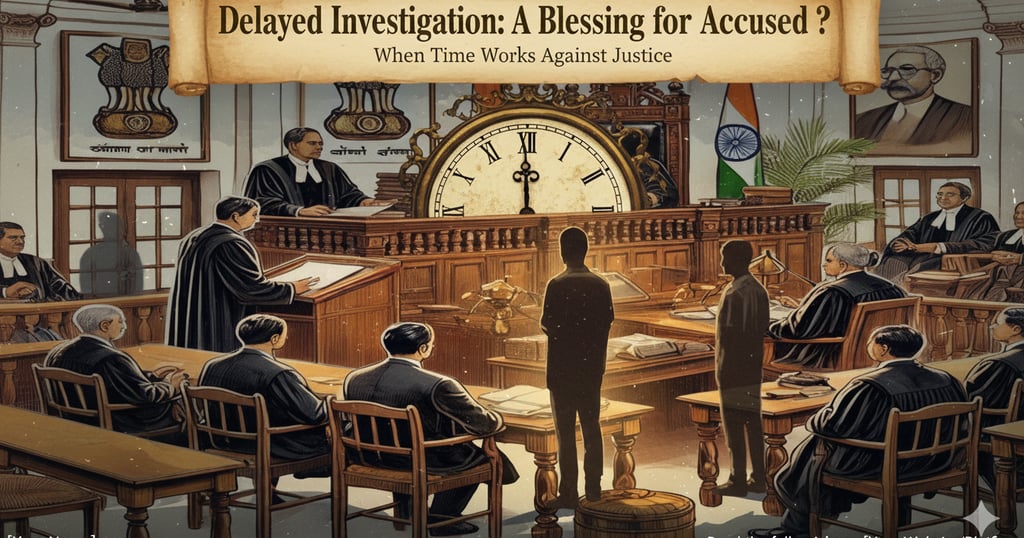Delayed Investigation: A Blessing for Accused ?
About the Author(s): We are pleased to feature this article, authored by Himanshi during their tenure as a legal intern at LCMA Law Firm. We commend their contribution and wish them great success in their legal career.
LAYMAN'S LAW
Himanshi
10/27/2025


What is the result in the event when police do not file a chargesheet within the stipulated time? Is it possible that even when a person is accused of murder or terroristic acts, he can walk away? Is there actually something termed as a default bail, which supersedes the gravity of the offence? In India, the Bharatiya Nagarik Suraksha Sanhita, 2023 (BNSS), Sec. 187 enshrines an indefeasible right of an accused under which his release on bail is enforced when a competent investigation is not conducted within specific statutory time-limit. This is a provision which was previously in place in Section 167 of the CrPC and is very important in the arsenal of defence counsel and the surety against detention before trial. It does bring the crux of that balancing between procedural rights and public safety rather starkly. The article highlights the “indefeasible right” that accused enjoys that sometimes act as blessing in disguise.
The person detained by police authorities needs to be produced before magistrate within 24 hrs is a well known fact. After which, the stage of investigation starts. Stage of investigation involves lodging of information, making preliminary enquiry, recording facts and circumstances, collecting evidence, interrogation by police officer, search and seizure and filing of chargesheet or police report. The time period provided to keep a person in police custody is 15 days under S. 187, BNSS ( earlier S. 167 Cr.P.C) , which could be extended to 60 days in case if the person is charged for an offence whose punishment is less than 10 years and upto 90 days where punishment is more than 10 years with the order of magistrate after which the chargesheet or police report needs to be filed.
Filing of chargesheet reflects the completion of investigation. If the chargesheet is filed timely u/s 193 BNSS, the trial goes on smoothly but if the authorities failed to file chargesheet in the provided time, the accused has a right to be released on bail. Such bail is known as ‘Default Bail’. It provides a great opportunity to criminal defence lawyers to get their client release out on bail as even if the case relates to offences punishable with death, Imprisonment for life or for a term of not less than 10 years, the command of the legislature is that the accused person has got to be released on bail even if the investigation may still be in progress. In Hussainara Khatoon v. Home Secretary, State of Bihar,1979, Lordships have held that, “When an undertrial prisoner is produced before a magistrate and he has been in detention for 90 days or 60 days, as the case may be, the magistrate must before making an order of remand to judicial custody, point out to the under-trial prisoner that he is entitled to be released on bail.” In other words as soon as the accused furnishes bail the magistrate has to release him on bail irrespective of the fact that the charge sheet has been submitted after passing an order under S. 187 of BNSS.
“Indefeasible right” To be released on bail is created in favour of the accused, if chargesheet is not filed on expiry of the statutory period as provided in S. 187(3) of BNSS, 2023. No doubt, the said right is indefeasible right, but the life of that right is from the expiry of the period of filing the chargesheet till the date the charge sheet is filed. Also, the right does not survive or remain enforceable on the chargesheet being filed and application filed during default is pending for disposal.
No person has a right to keep the accused in jail if the challan has not been filed within the prescribed period When the accused is applying for and is ready and willing to furnish bail to the satisfaction of the judicial magistrate. The right of the accused would stand defeated if he does not apply for grant of bail and the challan happens to be filed. Once the bail is granted to an accused, on simplifying of the challan, the accused cannot be taken back into the custody. For cancellation of the bail, the court is required to see not only the allegations but will have to keep in mind the observations made by the Supreme Court. None has an authority to say that because accused has committed a violent crime and as the bail granted to him is likely to be cancelled under section 480(5), bail under section 187(3) should not be granted. The rejection of the Bail application on merits has nothing to do with the default of the prosecution. But, If the court fails that the investigating agency or the investigating officer was hand in glove with the accused then the court may ask the superior officer to take an action against such defaulting officer but for the lapses committed by such an officer, the Accused cannot be denied the freedom.
Taking into the consideration this mandate of the legislature, it is clear that even after that order is passed for releasing the accused on bail, the accused would be released only when he furnished bail bond and not before that. In State v. E. Veeramani, 1995, The respondent admittedly did not avail the opportunity of getting himself released by furnishing surety on the basis of the order of bail granted to him in May, 1994.
Therefore, it can be concluded that, weather a person is entitled to be released on bail in view of the provisions of section 187 of BNSS Does not depend upon the question whether there is a prima facie Case against the accused and whether the offence is of serious nature. One has only to look to the question whether report under section 193 BNSS is submitted to the court within the prescribed or not. , If it is not submitted within the prescribed, then the provisions of section 187(3) come into play and the court cannot look to the marriage of the case for refusing bail to such an accused. Such accused is entitled to the benefit as of right as soon as it is established that report by the authorities is not submitted to the court of the magistrate within the prescribed.
Disclaimer: The views and opinions expressed in this article are solely those of the author(s) and do not necessarily reflect the official policy or position of LCMA Law Firm. This article is for informational purposes only and does not constitute legal advice. Readers should consult with a qualified legal professional for advice pertaining to their specific circumstances.

